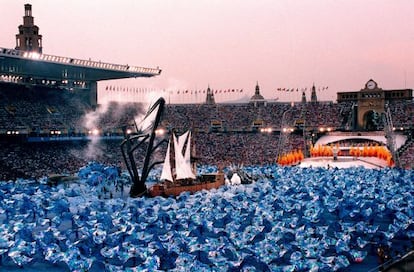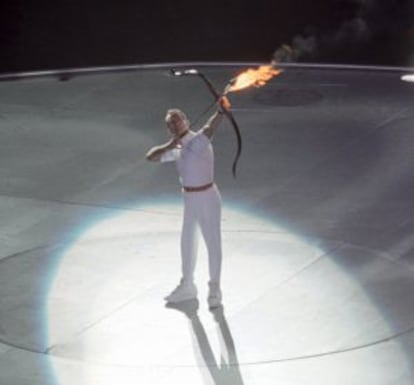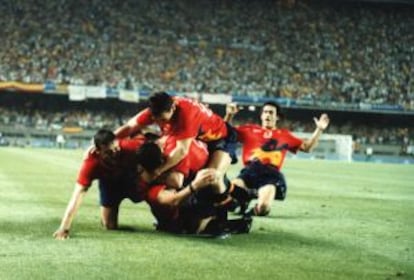The heroes of ¡¯92
Two decades ago, Spain hosted its first Olympic Games, which became a symbol of a changing country. Some of the key figures of the event share their memories

In 1991, Antonio Rebollo, a Paralympic archer, was training in Madrid when he received a telephone call. "It was the Spanish Olympic Organizing Committee, and they wanted me to light the Olympic flame at the opening ceremony in Barcelona using an arrow. It seemed like a strange idea, using an athlete with a disability, and I didn't pay much attention. Then they called me back and asked me to travel to Barcelona for a test run." Over the following months, Rebollo traveled to Barcelona several times to train in secret until he was able to cover the 67-meter distance to his target - perched 27 meters atop a specially constructed tower - with his eyes closed.
On the opening day of the Games, Rebollo remained cool, calm and collected, hitting his target to send a flame soaring into the early evening sky. It was a symbol of Spain's growing international presence, and of the change that was sweeping a country that had emerged from dictatorship barely 15 years before.
In 1978, less than three years after the death of General Francisco Franco and his 40 years of dictatorship, Spain was in the midst of a political transition headed by Adolfo Su¨¢rez, the country's first democratically elected prime minister. The country was about to hold a referendum on a new Constitution, and was set to devolve considerable powers to its regions. But it would be another year before elections would be held to decide on the country's mayors. The Socialist Party's Narcis Serra would be Barcelona's first democratically elected mayor since before the Spanish Civil War (1936-1939). He discovered that a combination of corruption and mismanagement had left the city virtually bankrupt. "There was enough money in the accounts for about one month. We needed a project, something that could turn things round," Serra explains.

Serra met with Juan Antonio Samaranch, then-ambassador to the Soviet Union, but who was set to take over the International Olympic Committee. "We agreed to work together to bring the Games to Barcelona if he became president of the IOC and I became mayor," says Serra.
"It was an opportunity for Barcelona to do something about its long-standing lack of infrastructure, to redevelop run-down areas of the city and redefine its relationship with the Mediterranean," says Pasqual Maragall, mayor of the Catalan capital between 1982 and 1997.
Maragall took over where Serra left off, and in 1986, Samaranch announced that the city's bid to host the 1992 Games had been awarded to Barcelona. The impact was felt immediately, as unsightly commuter train lines were taken underground, and factories and warehouses in the former port district were pulled down, to be replaced with an Olympic Village and marina. The Barceloneta, Sant Sebasti¨¢, Nova Ic¨¤ria beaches, as well as others, were cleaned up and made much more accessible from the city center.
Spain was in the midst of a political transition headed by PM Adolfo Su¨¢rez"
"The campaign we ran to get Barcelona nominated was superb. There was complete agreement between all parties involved: Barcelona City Hall, run by the Socialist Party; the regional government, which was controlled by the nationalists; and the central government, also controlled by the Socialist Party," says Jordi Pujol, who headed the right-wing CiU regional administration at the time.
Javier G¨®mez Navarro, secretary of state for sport between 1987 and 1993, suggests that things didn't always run as smoothly as they might have, particularly the Catalan regional government's efforts to turn the Games into a spearhead of Catalan independence. "Their slogan was 'Som una naci¨®,' referring to Catalonia as a nation. When the host country was Spain," he points out. Not that there weren't problems with the central government. "When we first put the idea forward, during the time of Su¨¢rez, I think that it would be fair to say that the government wasn't very keen on the idea of Barcelona hosting the Games," says Josep Miquel Aba, CEO of the Spanish Olympic Organizing Committee. He had been deputy mayor under Serra, and had been tasked with putting together a report on Barcelona's infrastructure, and what would be necessary to host the Games. "We understood the importance of maintaining good relationships with all concerned." He says that things improved when the Socialist Party government, led by Felipe Gonz¨¢lez, took over in 1982. "Thanks to men of the stature of Maragall, Pujol and Gonz¨¢lez, we were able to overcome some very difficult moments," says Abad.

And difficult moments there were. "The politicians and the media got very anxious in the early days. The most difficult thing was to convince everybody about the need for planning, and that it was better to take longer planning things rather than just getting stuck in," says Abad. "By thinking things through properly, we would save time and money later down the line," he adds. Nevertheless, between 1986 and 1989, when relatively little construction seemed to be taking place, the media and the public became concerned that Barcelona wouldn't be ready in time. The fears turned out to be unfounded, and the transformation of much of Barcelona's run-down port area impressed Spaniards.
"People understood that we were making a long-term investment. The Olympics lasts just two weeks, but the city is eternal. Let's be honest, Barcelona is still held up as an example of a successful Games. All the sports installations and facilities have been used since. The city was changed for the better, becoming a major tourist destination in the process. At the opposite end of the scale is Montreal, which hosted the Games in 1976; they were a complete failure. They ended up demolishing the Olympic Park. It was an economic disaster," says G¨®mez Navarro.
For around 15 seconds, the world's attention was focused on Rebollo; the time it took for the Paralympic archer to receive the Olympic flame from basketball star Juan Antonio San Epifanio and to send his arrow flying to its target. Fifteen seconds that seemed an eternity, watched by hundreds of millions of people around the planet. It was the inaugurating ceremony's culminating moment, and one of the highlights of Barcelona '92. "There was a very serious risk that the stunt wouldn't come off. He was using an old-fashioned wooden bow. Anybody with experience of archery knows what it means to fire without looking. A normal arrow weighs around 30 grams. That arrow weighed 200 grams. And if you factor in the pressure of being there... it was a tricky moment," says Rebollo.
There was a very serious risk that the stunt with the arrow wouldn't come off"
"Without that sense of danger, of the risk that it could all go horribly wrong, there is no emotion. But it was still a measured risk. At that distance, an archer like Rebollo can hit a target of one square meter," says Luis Bassat, a veteran of Spain's advertising industry, and the man responsible for organizing the opening ceremony. "But Rebollo's target area covered six meters." The decision to use such a dramatic means to light the torch made Barcelona's opening ceremony all the more memorable, and has yet to be repeated. At the same time, it symbolized the Organizing Committee's approach, according to artist Javier Mariscal, the creator of Cobi, the Games' mascot. "The city had a clear idea of what it wanted the Games to be," he says. "Maragall's approach was, 'Let's invent something,' and that turned into innovation, into risk-taking," he says. The Organizing Committee decided to invite two Catalan theater groups, La Fura dels Baus and Els Comediants, to participate in the opening ceremony. The former was best known for its shock tactics, typically involving nudity and hitting the audience with water and a barrage of noise, while Els Comediants had been developing its own brand of spectacle since 1971. "We weren't interested in having the Vienna Symphony Orchestra, if you get my drift. We took tremendous risks. We did everything possible to innovate and to reinvent things. And that was also the case with Cobi, who not everybody was too impressed with initially."
Bassat, who did like Cobi, says that Mariscal didn't create a very good impression at the meeting to present his mascot. "He turned up looking very scruffy, he didn't bother to take off his overcoat. He threw down a scrap of paper torn out of a notebook. It was a sketch done with a pencil, and it looked a bit like a dog," he says.
"I had deliberately not drawn a character that looked like a hero," says Mariscal. "He had a little beer belly, but he was also sporty, and somehow expressed the idea of Barcelona: a Mediterranean city where people drank beer at pavement caf¨¦s and where life was good."
Another surprise win went to the Spanish women's hockey team
The World Cup, which Spain had hosted a decade earlier, had set the precedent, and showed that the country was capable of hosting a major international event. Unfortunately, the Spanish national soccer side failed to meet the country's expectations. It was decided that in 1992, Spain would be a major competitor as well as host. Aside from giving the city a makeover and using the occasion to establish a brand identity, the idea was to make Spaniards feel good about themselves. "We needed to boost our self-esteem," says former Sports Minister G¨®mez Navarro. "For the first time ever, we decided to plan out a detailed training schedule. We realized that the different sports federations used public money to finance their daily activities. But if we wanted our athletes to win medals, they would need to undergo training at a new level, and that would mean money." Led by state television company TVE, a 75-million-euro plan was put together involving several state institutions and private sponsors, who would be given high visibility. "We brought in the best coaches from around the world: Cubans for volleyball and boxing, Russians for indoor cycling, Hungarians for fencing, and Belgians for sailing," says G¨®mez Navarro.
The plan produced the desired results. Spanish athletes won 22 medals, 13 of which were gold - it was a feat that has not been repeated since. Up until then, after almost a century of competing in the Olympic Games, Spain had won a total of 26 medals, only five of which were gold. Spain's medal hoard was beaten only by the former Soviet Union team, the US, Germany, China and Cuba. "I don't think that we will ever enjoy that kind of success again," says G¨®mez Navarro.
The star performers among Spain's Olympians in 1992 were the members of the sailing team, who won four golds and one silver. Part of the reason is obviously that they knew the waters off Barcelona better than any other team. But as is explained by Luis Doreste - who, along with teammate Domingo Manrique, won gold in the Flying Dutchman category - there was more money available for training in 1992 than any time previously or since. "Compared to Los Angeles in 1984, or Seoul in 1988, Barcelona was unprecedented. We had the best equipment. We knew that we had to have the best kit," he says.
The plan got results. Spain's athletes won 22 medals, 13 of which were golds
Spain got off to a good start, and as the country saw that its athletes were performing to the highest standards, there was a growing mood of confidence. "There was a moment when the medals just seemed to pour in - some of them unexpected, like pole-vaulter Garc¨ªa Chico, or Pe?alver's win in the decathlon... Everything went off well. The Games were managed impeccably. I think that we were justifiably proud of what we achieved," says Luis G¨®mez, who was the editor of EL PA?S' sports section at the time of the Games.
Other surprise wins came from Jordi Arrese, who won silver in tennis. "Barcelona was my opportunity to show that I was a good tennis player. I worked hard to get into shape. I had a lot of help along the way," he says.
Another surprise win went to the Spanish women's hockey team, the first time that a women's team had won gold. "I remember when it was announced that Barcelona would be hosting the Games, I volunteered to help, I had no idea that I would end up competing. It was very emotional, especially as the Games were held in my home town," says Eli Maragall, who scored the winning goal.
Disappointment, perhaps inevitably, given the mounting expectations, came the next day, when the water polo team was beaten after extra time by Italy. "It was exhausting, and we believed at the time that we would never have another opportunity to win gold," says Manel Estiarte, the side's captain. He was wrong: in Atlanta, four years later, Spain's water polo team would take gold.
In basketball, the '92 Games marked a turning point, with the home side losing to the US dream team by 41 points. "We simply weren't ready for that level of competition," says Juan Antonio San Epifanio, the side's captain. This was the first time that NBA professionals were allowed to play in the Olympics, and the finest players in the finest league came, saw, and conquered, as well as bringing a little glamour to the Games. But worse was to come for Spain, which lost to Angola by 20 points. From this point on, Spanish basketball would undergo a complete overhaul. San Epifanio says that while defeat was tough, he remembers the honor of being the last athlete to take the torch and hand it to Rebollo. "The night before the inauguration, I was taken out of the Olympic Village without anybody knowing about it. Over the course of the night we did three rehearsals. I was very proud of the opportunity to pay my respects to a city that I had made my home." The next day, before a global audience of two billion people, San Epifanio held his nerve. "I listened to the music, I waited, and then I passed the flame to Rebollo at the right moment." At which point, the archer prepared his arrow, and after 15 seconds sent it flying through the air. Twenty years later, that moment still symbolizes a turning point for modern Spain.
Tu suscripci¨®n se est¨¢ usando en otro dispositivo
?Quieres a?adir otro usuario a tu suscripci¨®n?
Si contin¨²as leyendo en este dispositivo, no se podr¨¢ leer en el otro.
FlechaTu suscripci¨®n se est¨¢ usando en otro dispositivo y solo puedes acceder a EL PA?S desde un dispositivo a la vez.
Si quieres compartir tu cuenta, cambia tu suscripci¨®n a la modalidad Premium, as¨ª podr¨¢s a?adir otro usuario. Cada uno acceder¨¢ con su propia cuenta de email, lo que os permitir¨¢ personalizar vuestra experiencia en EL PA?S.
En el caso de no saber qui¨¦n est¨¢ usando tu cuenta, te recomendamos cambiar tu contrase?a aqu¨ª.
Si decides continuar compartiendo tu cuenta, este mensaje se mostrar¨¢ en tu dispositivo y en el de la otra persona que est¨¢ usando tu cuenta de forma indefinida, afectando a tu experiencia de lectura. Puedes consultar aqu¨ª los t¨¦rminos y condiciones de la suscripci¨®n digital.









































